13 Feb2021
By Katrina Norfleet
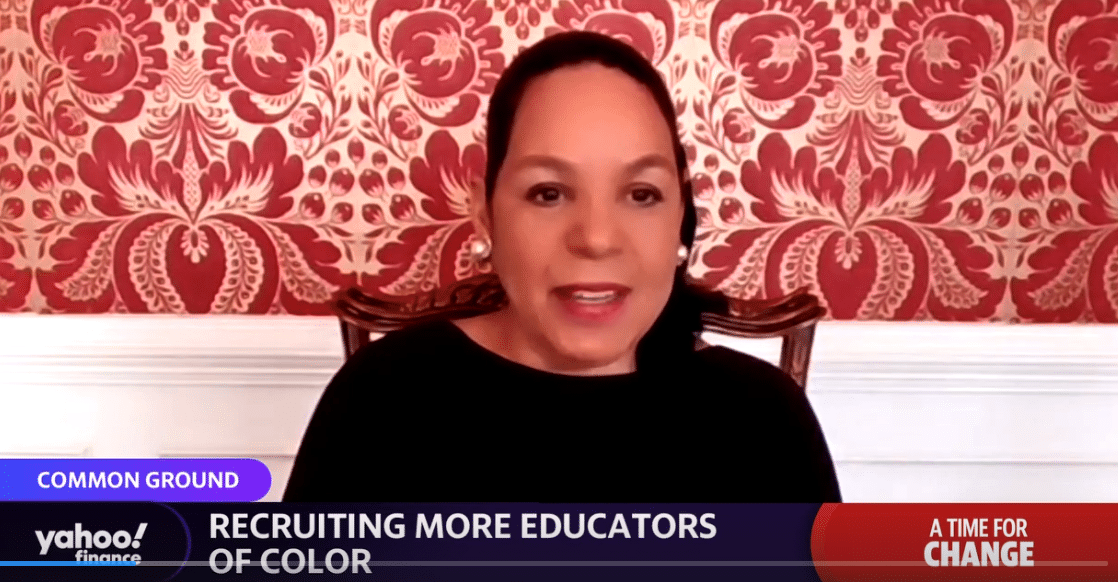 Findings show that in the public school system nationwide, only 7% of teachers, 11% of principals, and 3% of superintendents are Black. In the following Yahoo Finance Live video interview, AACTE Dean in Residence Leslie Fenwick explores this topic. She discusses the impact desegregation of public schools has had on the decline of the Black teacher pipeline and what steps should be taken to reverse the trend.
Findings show that in the public school system nationwide, only 7% of teachers, 11% of principals, and 3% of superintendents are Black. In the following Yahoo Finance Live video interview, AACTE Dean in Residence Leslie Fenwick explores this topic. She discusses the impact desegregation of public schools has had on the decline of the Black teacher pipeline and what steps should be taken to reverse the trend.
Watch the video.
29 Jan2021
By Kathleen M. DaBoll-Lavoie, Ph.D.
This article originally appeared in University Business and is reprinted with permission.
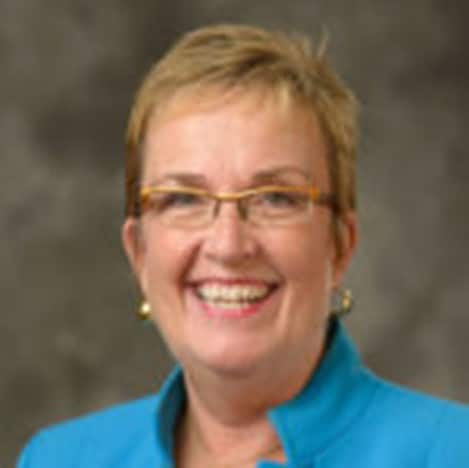 As we enter the new year, many education leaders are questioning the impact of the pandemic on educator preparation programs (EPPs) and the pipeline of new teachers entering classrooms in 2021 and beyond.
As we enter the new year, many education leaders are questioning the impact of the pandemic on educator preparation programs (EPPs) and the pipeline of new teachers entering classrooms in 2021 and beyond.
Will colleges and universities expand and invest in their education programs to meet the demand for new teachers as educators retire due to COVID-19 health concerns? Will they downsize their education programs due to budget cuts resulting from the pandemic? Will they find innovative ways to collaborate with other institutions to sustain their education programs?
While there are many uncertainties, what we do know is that if educational programs are scaled back or terminated, the national teacher shortage will be exacerbated.
19 Jan2021
By Meg Kamman and Tim Neubert
 The American Association for Employment in Education (AAEE) is requesting AACTE members’ participation in the 2020-2021 Educator Supply and Demand Survey, conducted in conjunction with the Center for Marketing & Opinion Research, LLC (CMOR). Both AAEE members and non-members are invited and encouraged to participate.
The American Association for Employment in Education (AAEE) is requesting AACTE members’ participation in the 2020-2021 Educator Supply and Demand Survey, conducted in conjunction with the Center for Marketing & Opinion Research, LLC (CMOR). Both AAEE members and non-members are invited and encouraged to participate.
With data and perceptions gathered from colleges, universities, and school systems over several decades, the report generated will provide you and your institution with valuable regional and national insights and trends in PK-12 educator supply and demand. An electronic version of this report will be provided to all respondents in Spring 2021 at no cost.
Completion of the survey should take about 15 minutes and all responses will remain confidential.
Preview questions (in PDF format) prior to survey completion.
College or University? Complete this survey.
School District? Complete this survey.
04 Dec2020
By Audrey Hill
The University of Maryland, Prince George’s Community College and Prince George’s County Public Schools announced a dual enrollment program to increase the teaching workforce in the state.
The Middle College Program enables high schoolers from county schools to earn an associate of arts degree in teaching while completing their high school requirements. Dual enrollment students can then transfer seamlessly into the UMD College of Education’s undergraduate teaching program; the program also aligns with Bowie State University and Howard University’s academic requirements.
“The collaboration is a reflection of our commitment to developing innovative new pathways to prepare an excellent and diverse teacher workforce for Prince George’s County Public Schools and for the state of Maryland,” said Jennifer King Rice, dean of the College of Education. “This model of ‘growing your own’ teachers will increase diversity in the education field, develop teachers from the local community and address critical teaching shortages.”
30 Nov2020
By Erica D. McCray
This article originally appeared in District Administration and is reprinted with permission.
 The teacher shortage is real, complex, and concerning—especially in high-demand specialty areas such as special education, math and science, English as a second language, and foreign language. This comes as no surprise, as many reports indicate low enrollment in these educator preparation program (EPP) teaching areas. While it is important to reflect upon the current state of the teacher shortage, it is imperative that EPPs analyze changes in student enrollment to determine future implications for the teacher workforce.
The teacher shortage is real, complex, and concerning—especially in high-demand specialty areas such as special education, math and science, English as a second language, and foreign language. This comes as no surprise, as many reports indicate low enrollment in these educator preparation program (EPP) teaching areas. While it is important to reflect upon the current state of the teacher shortage, it is imperative that EPPs analyze changes in student enrollment to determine future implications for the teacher workforce.
The American Association of Colleges for Teacher Education (AACTE) recently released the issue brief, Degree Trends in High-Demand Teaching Specialties. Authored by Jacqueline E. King, Ph.D., the report examines trends in sub-specialties within the high-demand areas based on data that colleges report to the U.S. Department of Education’s Integrated Postsecondary Education Data System (IPEDS). While the report offers a few bright spots, it suggests that current PK-12 school shortages will not be remedied simply by hiring newly-prepared teachers.
23 Oct2020
By Jacqueline E. King, Ph.D.
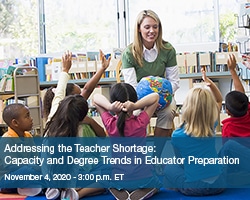 Before the coronavirus pandemic, there were significant teacher shortages in many communities. Since the pandemic began, teacher retirements and other departures from the profession have accelerated. Can the nation’s higher education institutions meet the demand for new teachers, particularly in high-demand fields such as special education, STEM, and foreign language? What do trends over the last decade portend for the future of educator preparation?
Before the coronavirus pandemic, there were significant teacher shortages in many communities. Since the pandemic began, teacher retirements and other departures from the profession have accelerated. Can the nation’s higher education institutions meet the demand for new teachers, particularly in high-demand fields such as special education, STEM, and foreign language? What do trends over the last decade portend for the future of educator preparation?
An upcoming webinar will review the findings from two new AACTE issue briefs that address these questions:
- Institutions Offering Degrees in Education: 2009-10 to 2018-19
- Degree Trends in High-Demand Teaching Specialties: 2009-10 to 2018-19
07 Oct2020
By Weade James
AACTE recently published an article in the Success in High Need Schools Journal to amplify promising practices for recruiting and retaining teacher candidates. In this article, titled “The Use of Networked Improvement Communities in Educator Preparation Programs to Improve Teacher Shortage and Diversity”, Jacqueline Rodriguez , AACTE vice president, research, policy, & advocacy, and I highlight the contributing factors to the teacher shortage and diversity crises in our nation.
These factors include but are not limited to the declining enrollment and degrees awarded in education, financial barriers to pursuing a teaching credential, and the lack of culturally-relevant strategies to attract and retain diverse candidates. Research show that these factors are more prevalent for minorities, thus contributing to the dismal representation of minority teachers in the profession compared to their White counterparts (80%).
23 Jul2020
By Jerrica Thurman
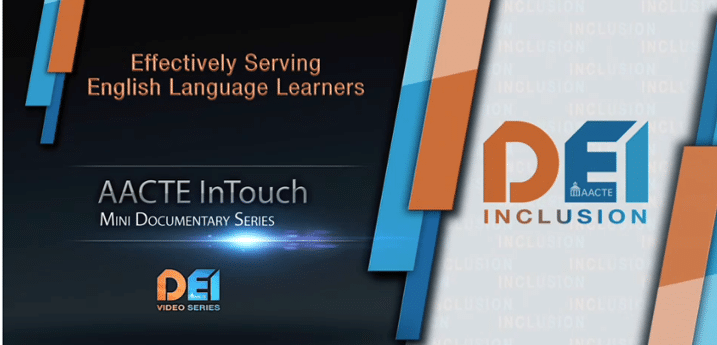
Ed Prep Matters features the “Revolutionizing Education” column to spotlight the many ways AACTE, member institutions, and partners are pioneering leading-edge research, models, strategies and programs that focus on the three core values outlined in the current AACTE strategic plan: Diversity, Equity, and Inclusion; Quality and Impact; and Inquiry and Innovation.
In this final installment of the first Diversity, Equity and Inclusion video series, AACTE members discuss the importance of preparing high quality teachers to educate the growing population of English language learners in the U.S. Statistics show English language learners currently represent 25% of the student body and are expected to grow to 50% within the next five years.
In “Effectively Serving English Language Learners,” Jacqueline Rodriguez, AACTE Vice President, Research, Policy and Advocacy said, “according to the U.S. Department of Education, we’ve seen dramatic increases in English language learners across the country. Some states have increases of over 40% since 2010.” “It’s very important now that we see how our population of students is changing, and what our teacher candidates are facing in the future,” said Cathleen Skinner, director of world languages for Oklahoma State Department of Education. “[We need] to ensure that we are providing our candidates with a kind of content to meet the needs of today’s diverse students, and to make sure that they are comfortable and have had experiences working with families and communities that differ from their own,” said Wanda Blanchett, dean of the graduate school of education at Rutgers University New Brunswick. “That means the teachers are going to have to develop relationships with people outside the educational community,” said Brian Williams, director of the Alonzo A. Crim Center for Urban Educational Excellence at Georgia State University.
Watch the full video.
View the complete first series of AACTE’s DEI videos on the Video Wall. Stay tuned for the second series of the DEI videos coming this fall. Help AACTE spread the word by sharing the videos with your social network!
10 Jul2020
AACTE DEI Video: A Focus on Recruiting and Retaining Black and Hispanic/Latino Male Teachers
By Jerrica Thurman
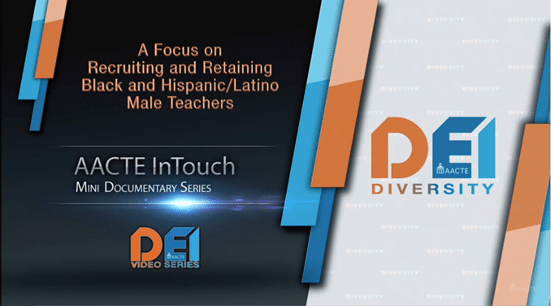
Ed Prep Matters features the “Revolutionizing Education” column to spotlight the many ways AACTE, member institutions, and partners are pioneering leading-edge research, models, strategies and programs that focus on the three core values outlined in the current AACTE strategic plan: Diversity, Equity, and Inclusion; Quality and Impact; and Inquiry and Innovation.
During this segment of the Diversity, Equity and Inclusion video series, AACTE members who participated in a 5-year study discuss their findings on ways to increase representation of men of color into the teaching profession. In “A Focus on Recruiting and Retaining Black and Hispanic/Latino Male Teachers,” researchers share the collective approaches campus-wide and across generations and disciplines required to effectively diversify the teacher pipeline.
17 Mar2020
By Timara Davis and Sacha Cartegena

The national teacher shortage has required all stakeholders to take action. What do we know and what can we do? The Annual Meeting “Addressing the Teacher Shortage” Deeper Dive session brought together a panel of experts to discuss the alarming data on and present strategies to combat this epidemic. The panel consisted of AACTE consultants Jacqueline King and Jane West; Zeke Perez, policy analyst, Education Commission of the States; and AACTE board member Marquita Grenot-Scheyer from the Office of the Chancellor at the California State University System.
Jacqueline Rodriguez, vice president, program and professional learning at AACTE, served as the moderator. She began the session by providing a national overview as it relates to the teacher shortage by highlighting, “As a Nation, we have …
- A decline in enrollment in teacher preparation programs;
- Significant lack of diversity in our educators: race, ethnicity, gender, identity, disability;
- High poverty schools which experience disproportionate teacher shortages;
- Schools with high enrollment of students of color more likely to employ uncertified teachers; and
- Teacher turnover at a significant high financial cost.
06 Mar2020
By Anna Stolley Persky
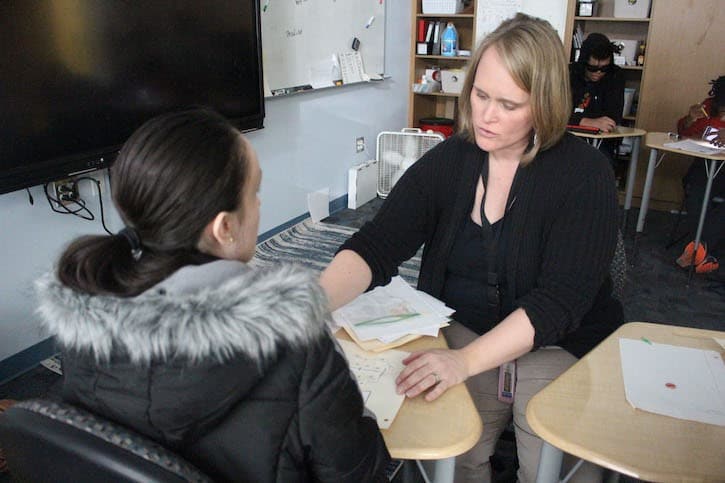
Julie Conner, a teacher at the Virginia School for the Visually Impaired, works with a female student with vision impairment.
This article originally appeared on the George Mason University website and is reprinted with permission.
The United States is in desperate need of educators who can read and teach braille, according to the National Federation of the Blind (NFB). Less than 10% of the 1.3 million people who are legally blind in the U.S. are able to read braille, according to a 2009 report by the NFB.
But few U.S. colleges offer programs that prepare teachers to educate students who are visually impaired, according to Kimberly Avila, professor-in-charge of the teacher preparation program in blindness and vision impairment within the College of Education and Human Development. Avila is also the coordinator for the Virginia Consortium for Teacher Preparation in Vision Impairment.
12 Feb2020
Will provide scholarships up to $4,800 to help teacher assistants earn teaching degrees
By Joan Mitchell
WGU North Carolina, an affiliate of the national online Western Governors University, has signed an agreement with Rowan-Salisbury School System (RSS) to help classified staff, such as teacher assistants, advance their careers by earning bachelor’s degrees and teacher certifications.
Any Rowan-Salisbury School System teacher assistant who enrolls in one of WGU North Carolina’s teacher-preparation programs will receive up to $800 in tuition credit per six-month term, after any Pell Grants have been exhausted, for up to three years. RSS employees will also receive an application-fee waiver code.
Additionally, WGU North Carolina will create a unique URL for RSS employees and promote this opportunity through printed materials, social media, on-site presentations and other channels. Employees will also have access to WGU career services resources and events, and WGU NC staff will be available to participate in any education/benefits fairs, seminars, and “lunch and learn” presentations offered by Rowan-Salisbury Schools.
11 Feb2020
By Mary T. Brownell
 Throughout the United States, schools are facing a critical shortage of special education teachers. This crisis is growing due to an emerging demand for special education teachers, coupled with a diminishing number of qualified candidates, recruitment challenges, and a high turnover rate. Reversing this crisis requires a multiprong approach that includes short- and long-term strategies to prepare and support teachers. Special education is complex, and one common type of instruction does not support all disabilities. To promote equity in education, we must ensure students with disabilities have access to proper assessment, resources, and qualified educators that correspond with their needs.
Throughout the United States, schools are facing a critical shortage of special education teachers. This crisis is growing due to an emerging demand for special education teachers, coupled with a diminishing number of qualified candidates, recruitment challenges, and a high turnover rate. Reversing this crisis requires a multiprong approach that includes short- and long-term strategies to prepare and support teachers. Special education is complex, and one common type of instruction does not support all disabilities. To promote equity in education, we must ensure students with disabilities have access to proper assessment, resources, and qualified educators that correspond with their needs.
04 Feb2020
By Cynthia Howell
 This article originally appeared in the Arkansas Democrat Gazette and the excerpt below is reprinted with permission.
This article originally appeared in the Arkansas Democrat Gazette and the excerpt below is reprinted with permission.
A recent three-year drop in the number of people enrolled in Arkansas teacher preparation programs appears to have bottomed out, and the number is on the upswing, preliminary data from the Arkansas Division of Elementary and Secondary Education show.
The number of enrollees in the state’s teacher preparation programs for 2018-19 was 4,443.
23 Jan2020
By Aaron Mudd
This article originally appeared in Bowling Green Daily News and is reprinted with permission.
A federal grant award topping $1 million to Western Kentucky University will help address a shortage of special education professionals seen regionally and across Kentucky.
“The shortages are felt nationally, but definitely in an acute manner in our rural communities,” said WKU College of Education and Behavioral Sciences Dean Corinne Murphy, whose college is heading up the effort called Project PREP, or Preparing Rural Educators and Professionals for Students with High-Intensity Needs.
The American Association of Colleges for Teacher Education said there’s a shortage and a lack of diversity of fully prepared and credentialed special education teachers in public schools across the country.
 Findings show that in the public school system nationwide, only 7% of teachers, 11% of principals, and 3% of superintendents are Black. In the following Yahoo Finance Live video interview, AACTE Dean in Residence Leslie Fenwick explores this topic. She discusses the impact desegregation of public schools has had on the decline of the Black teacher pipeline and what steps should be taken to reverse the trend.
Findings show that in the public school system nationwide, only 7% of teachers, 11% of principals, and 3% of superintendents are Black. In the following Yahoo Finance Live video interview, AACTE Dean in Residence Leslie Fenwick explores this topic. She discusses the impact desegregation of public schools has had on the decline of the Black teacher pipeline and what steps should be taken to reverse the trend. 






 As we enter the new year, many education leaders are questioning the impact of the pandemic on educator preparation programs (EPPs) and the pipeline of new teachers entering classrooms in 2021 and beyond.
As we enter the new year, many education leaders are questioning the impact of the pandemic on educator preparation programs (EPPs) and the pipeline of new teachers entering classrooms in 2021 and beyond. The American Association for Employment in Education (AAEE) is requesting AACTE members’ participation in the 2020-2021 Educator Supply and Demand Survey, conducted in conjunction with the Center for Marketing & Opinion Research, LLC (CMOR). Both AAEE members and non-members are invited and encouraged to participate.
The American Association for Employment in Education (AAEE) is requesting AACTE members’ participation in the 2020-2021 Educator Supply and Demand Survey, conducted in conjunction with the Center for Marketing & Opinion Research, LLC (CMOR). Both AAEE members and non-members are invited and encouraged to participate. The teacher shortage is real, complex, and concerning—especially in high-demand specialty areas such as special education, math and science, English as a second language, and foreign language. This comes as no surprise, as many reports indicate low enrollment in these educator preparation program (EPP) teaching areas. While it is important to reflect upon the current state of the teacher shortage, it is imperative that EPPs analyze changes in student enrollment to determine future implications for the teacher workforce.
The teacher shortage is real, complex, and concerning—especially in high-demand specialty areas such as special education, math and science, English as a second language, and foreign language. This comes as no surprise, as many reports indicate low enrollment in these educator preparation program (EPP) teaching areas. While it is important to reflect upon the current state of the teacher shortage, it is imperative that EPPs analyze changes in student enrollment to determine future implications for the teacher workforce. Before the coronavirus pandemic, there were significant teacher shortages in many communities. Since the pandemic began, teacher retirements and other departures from the profession have accelerated. Can the nation’s higher education institutions meet the demand for new teachers, particularly in high-demand fields such as special education, STEM, and foreign language? What do trends over the last decade portend for the future of educator preparation?
Before the coronavirus pandemic, there were significant teacher shortages in many communities. Since the pandemic began, teacher retirements and other departures from the profession have accelerated. Can the nation’s higher education institutions meet the demand for new teachers, particularly in high-demand fields such as special education, STEM, and foreign language? What do trends over the last decade portend for the future of educator preparation? 



 Throughout the United States, schools are facing a critical shortage of special education teachers. This crisis is growing due to an emerging demand for special education teachers, coupled with a diminishing number of qualified candidates, recruitment challenges, and a high turnover rate. Reversing this crisis requires a multiprong approach that includes short- and long-term strategies to prepare and support teachers. Special education is complex, and one common type of instruction does not support all disabilities. To promote equity in education, we must ensure students with disabilities have access to proper assessment, resources, and qualified educators that correspond with their needs.
Throughout the United States, schools are facing a critical shortage of special education teachers. This crisis is growing due to an emerging demand for special education teachers, coupled with a diminishing number of qualified candidates, recruitment challenges, and a high turnover rate. Reversing this crisis requires a multiprong approach that includes short- and long-term strategies to prepare and support teachers. Special education is complex, and one common type of instruction does not support all disabilities. To promote equity in education, we must ensure students with disabilities have access to proper assessment, resources, and qualified educators that correspond with their needs. This article originally appeared in the
This article originally appeared in the